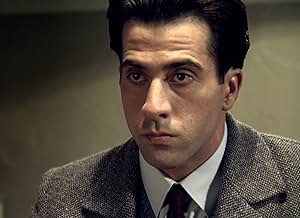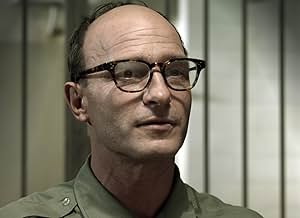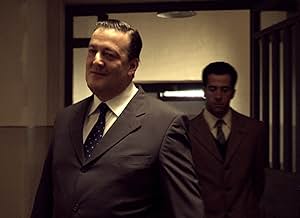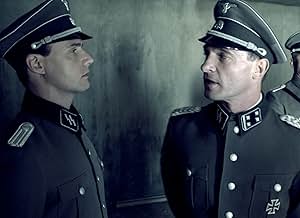VALUTAZIONE IMDb
5,9/10
3661
LA TUA VALUTAZIONE
La vita di Adolf Eichmann, uno dei più importanti gerarchi nazisti, ricostruita attraverso la confessione fatta prima di essere giustiziato in Israele.La vita di Adolf Eichmann, uno dei più importanti gerarchi nazisti, ricostruita attraverso la confessione fatta prima di essere giustiziato in Israele.La vita di Adolf Eichmann, uno dei più importanti gerarchi nazisti, ricostruita attraverso la confessione fatta prima di essere giustiziato in Israele.
- Regia
- Sceneggiatura
- Star
Avner W. Less
- Self
- (filmato d'archivio)
- (voce)
Tereza Srbova
- Baroness Ingrid von Ihama
- (as Tereza Srbová)
Tilly O'Neil
- Hannah
- (as Tilly Golding)
Recensioni in evidenza
There are a lot of things about "Eichmann" which seem curiously wrong. For one thing, this Eichmann is a lot more interesting and colourful than the real man appears to have been. There's a bizarre scene in which he is challenged by his very weird Hungarian mistress to shoot a baby; I won't give away whether or not he does so, but it's not something I've ever heard of before. This Eichmann is a womaniser, a bit of a boozer, altogether a more louche and raffish figure than the rather dull bureaucrat that I've always read Eichmann described as.
Yes, the film suffers from some weird accents. Thomas Kretschmann, as Eichmann himself, speaks in a clipped German accent; Troy Garity, Franka Potente and Stephen Fry (in a bizarre but oddly convincing performance as, of all things, the Israeli Minister of Justice) all have indeterminately foreign accents, and none of it really makes sense.
Having said that, Kretschmann carries off the job he has been asked to do, and Garity is really very good as Avner Less, who was not Eichmann's prosecutor (as someone else stated) but his interrogator. Less was not a lawyer but a police officer. The subplot of his wife being chronically ill is presumably there because it was true; it would have been better if they'd left it out, because what drama there is in this film is the battle of wills between Less the dogged interrogator and Eichmann the stolidly evasive interrogatee.
I note in passing that Stephen Fry might almost be the rather more well-fed first cousin, or perhaps uncle, of Ciaran Hinds in "Munich". The accent is the same, and the tallness, slicked-down hair and intimidating bulk is very similar.
If they'd toned down the lurid stuff about Eichmann's sex life and focused on what he actually did for a living, this could have been as good as "Conspiracy". Pity.
Yes, the film suffers from some weird accents. Thomas Kretschmann, as Eichmann himself, speaks in a clipped German accent; Troy Garity, Franka Potente and Stephen Fry (in a bizarre but oddly convincing performance as, of all things, the Israeli Minister of Justice) all have indeterminately foreign accents, and none of it really makes sense.
Having said that, Kretschmann carries off the job he has been asked to do, and Garity is really very good as Avner Less, who was not Eichmann's prosecutor (as someone else stated) but his interrogator. Less was not a lawyer but a police officer. The subplot of his wife being chronically ill is presumably there because it was true; it would have been better if they'd left it out, because what drama there is in this film is the battle of wills between Less the dogged interrogator and Eichmann the stolidly evasive interrogatee.
I note in passing that Stephen Fry might almost be the rather more well-fed first cousin, or perhaps uncle, of Ciaran Hinds in "Munich". The accent is the same, and the tallness, slicked-down hair and intimidating bulk is very similar.
If they'd toned down the lurid stuff about Eichmann's sex life and focused on what he actually did for a living, this could have been as good as "Conspiracy". Pity.
Renowned war criminal Adolf Eichmann has been found at large in Argentina by Israeli agents, where he is promptly kidnapped and brought to Israel for trial. Avner Less is appointed as his interrogator before the trial. The Israeli nation is baying for his blood outside, which makes Less's task of being impartial all the harder. The film revolves around their interviews, Eichmann's replies to certain questions about his past atrocities bringing us back through flashback to the war. Eichmann naturally denies the offences and puts most down to obeying orders. The cat and mouse of the interviewing process and its gradual progression is very interesting and well crafted. Thomas Kretschmann's performance in particular as Eichmann is excellent and the film belongs to him.
The film begins with some introductory lines as , ¨Holocaust (1933-1945)¨ : Extermination of European Jews and others by the Nazi regime in Germany. The Nazi persecution reached its peak in the Final solution , a programme of mass extermination adopted in 1942 and carried out with murderous efficiency by Adolf Eichmann ¨. In addition, ¨Adolf Eichmann¨: German administrator, he was responsible for carrying out Hitler's Final solution and for administrating the concentration camps in which 6 million Jewish perished. After the war he went into hiding in Argentina and eluded the Nuremberg trials. World Encyclopedia , Oxford University Press.
This is a historic drama with biographic elements dealing with Adolf Eichman and his interrogator officer Avner Less well performed by Thomas Kretschmann and Troy Garity, respectively. Furthermore, Stephen Fry as Jewish Minister and Franka Potente as affecting Avner's wife. The story is carried out by means of various flashbacks describing the cruel existence of Eichmannn. Atmospheric musical score by Richard Harvey and cold cinematography by Mike Connor. The motion picture is professionally by Robert Young.
Adding more remarks along with the widely narrated on the movie referred to Adolf Eichmann, his life is the following : Eichmann (1906-62) was born in Austria. After starting as a lowly file clerk , he learned that there was an opening in Heinrich Himmler's SD, the information center for the Gestapo . Himmler, who believed that Eichmann could speak Hebrew, made him head of the Scientific Museum Jewish Affairs. In 1937 Eichmann paid a short visit to Palestine to get in touch with Arab leaders , but the was ordered out of the country by the British. On his return to Germany he was rapidly promoted. After service in the Reich Central Office of Jewish Emigration he was made chief of Subsection IV-B-4 of the RSHA, the Reich Central Security Office, as an expert on Jewish affairs. He was present at the Wansee Conference on January 20 , 1942, when it was decided to deport Jews to the extermination camps. In August 1944 Eichmann reported to Himmler that, although the death camps kept no exact statistics , 4 million Jews had died in them and that 2 million more had been shot or killed by mobile units. Arrested at the end of WWII, Eichmann escaped unrecognized from an internment camp in the American zone in 1946 and disappeared. On May 11, 1969, the Israeli secret service found him in Argentina and smuggling him back to Israel . His trial , which took place in Jerusalem from April 11 to August 14, 1961, aroused worldwide attention. He was charged with crimes against humanity, and war crimes. Found guilty, he was hanged at Ramle on May 31,1962.
This is a historic drama with biographic elements dealing with Adolf Eichman and his interrogator officer Avner Less well performed by Thomas Kretschmann and Troy Garity, respectively. Furthermore, Stephen Fry as Jewish Minister and Franka Potente as affecting Avner's wife. The story is carried out by means of various flashbacks describing the cruel existence of Eichmannn. Atmospheric musical score by Richard Harvey and cold cinematography by Mike Connor. The motion picture is professionally by Robert Young.
Adding more remarks along with the widely narrated on the movie referred to Adolf Eichmann, his life is the following : Eichmann (1906-62) was born in Austria. After starting as a lowly file clerk , he learned that there was an opening in Heinrich Himmler's SD, the information center for the Gestapo . Himmler, who believed that Eichmann could speak Hebrew, made him head of the Scientific Museum Jewish Affairs. In 1937 Eichmann paid a short visit to Palestine to get in touch with Arab leaders , but the was ordered out of the country by the British. On his return to Germany he was rapidly promoted. After service in the Reich Central Office of Jewish Emigration he was made chief of Subsection IV-B-4 of the RSHA, the Reich Central Security Office, as an expert on Jewish affairs. He was present at the Wansee Conference on January 20 , 1942, when it was decided to deport Jews to the extermination camps. In August 1944 Eichmann reported to Himmler that, although the death camps kept no exact statistics , 4 million Jews had died in them and that 2 million more had been shot or killed by mobile units. Arrested at the end of WWII, Eichmann escaped unrecognized from an internment camp in the American zone in 1946 and disappeared. On May 11, 1969, the Israeli secret service found him in Argentina and smuggling him back to Israel . His trial , which took place in Jerusalem from April 11 to August 14, 1961, aroused worldwide attention. He was charged with crimes against humanity, and war crimes. Found guilty, he was hanged at Ramle on May 31,1962.
This acceptable biopic deals basically with the pretrial interrogation of Adolf Eichmann after he was captured in Argentina and brought to Israel. In the interrogation, he insists his role in the Holocaust was minor, just a sort of transport commissioner who has to make sure the different prisoners arrive on time at each concentration camp. This is contrasted with flashbacks from Eichmann during World War II, showing him directly in charge of the extermination of Jews. His main interrogator is a police captain, and the movie shows some of his background, how his role affects his family life, etc. German actor Thomas Kretschmann, who has made a career of playing Nazi officers (in Downfall, Stalingrad and Valkyrie, for instance) is very good as the Nazi criminal. So is Troy Garity playing the Israeli detective. Maybe the movie would have benefited from a larger scope – it includes nothing of Eichmann during the trial itself, very few about his life in Argentina, his capture is dealt in just one quick scene. And there were a few scenes that sounded false to me. For example, Eichmann is seen making love to a Hungarian mistress during the war and to get her hot he tells her the amounts of people he ordered killed. Or in another scene the same lady dares Eichmann to kill a baby. Maybe it really happened but the way it is portrayed in the movie sounded downright false and tasteless to me. These few objections aside, this is not a bad film.
First, the good stuff:
Thomas Kretschmann's work here is superb, truly superb, particularly in light of the fact that the film interrupts this superb acting with cutaways to various scenes while the voice of Kretschmann as Eichmann is heard writing letters to his children. I don't CARE. Give me more of Kretschmann being interrogated. He is riveting.
Now, the bad stuff:
The 'artistic license' this film takes is shameful in that it is an insult to every single jew who was murdered by the Nazi regime. There is no good reason for the filmmakers to have given Eichmann a Viennese Jew for a mistress. The notes of Eichmann's interrogator, Avner Less, do not mention anything about this, nor did it come up in Eichmann's Nuremberg trial-in-absentia or the Israeli trial. Nor was there a need to make Eichmann the lover of a Hungarian mistress who was so insatiable for the deaths of jews that she would reprimand him for not killing enough while they engaged in foreplay. This is obscene and it obscures the larger truth that seemingly inconsequential, everyday men can do terrible damage.
To take these liberties is an attempt to obscure the monster that Eichmann really was. To remove the inexplicable terror that is the result of banal men doing unspeakable things in the name of ideology and / or the protection of a larger group of criminals, is misguided at best and an insult to every Jewish man, woman and child who walked into those building thinking they were going to get a shower.
They should have stuck to the text of "The Eichmann Interrogation" and let the actors use their skills to produce the tension. That's what they are paid for, after all, and I would have liked to have seen more of the interaction between the two main characters.
I give it a '4' on the strength of Thomas Kretschmann's acting alone. Otherwise this movie is a terrible waste of time.
Thomas Kretschmann's work here is superb, truly superb, particularly in light of the fact that the film interrupts this superb acting with cutaways to various scenes while the voice of Kretschmann as Eichmann is heard writing letters to his children. I don't CARE. Give me more of Kretschmann being interrogated. He is riveting.
Now, the bad stuff:
The 'artistic license' this film takes is shameful in that it is an insult to every single jew who was murdered by the Nazi regime. There is no good reason for the filmmakers to have given Eichmann a Viennese Jew for a mistress. The notes of Eichmann's interrogator, Avner Less, do not mention anything about this, nor did it come up in Eichmann's Nuremberg trial-in-absentia or the Israeli trial. Nor was there a need to make Eichmann the lover of a Hungarian mistress who was so insatiable for the deaths of jews that she would reprimand him for not killing enough while they engaged in foreplay. This is obscene and it obscures the larger truth that seemingly inconsequential, everyday men can do terrible damage.
To take these liberties is an attempt to obscure the monster that Eichmann really was. To remove the inexplicable terror that is the result of banal men doing unspeakable things in the name of ideology and / or the protection of a larger group of criminals, is misguided at best and an insult to every Jewish man, woman and child who walked into those building thinking they were going to get a shower.
They should have stuck to the text of "The Eichmann Interrogation" and let the actors use their skills to produce the tension. That's what they are paid for, after all, and I would have liked to have seen more of the interaction between the two main characters.
I give it a '4' on the strength of Thomas Kretschmann's acting alone. Otherwise this movie is a terrible waste of time.
Lo sapevi?
- QuizAccording to a British reporter on location, fellow cast members Troy Garity and Thomas Kretschmann were so upset with script revisions of the baby-in-office scene that Kretschmann promptly threw them in the trash, explaining, 'I'll just file this here for safekeeping.' The revisions were later dropped.
- Blooper(at around 1 min) In the scene where the minister leaves the room after telling Avner that his father had been sent to Auschwitz by Eichmann, a large contemporary map of Europe is visible on the wall. The maps contains the re-unified Germany, the successor states of the Soviet Union, the broken up former Yugoslavia, and the split Czech and Slovak Republics - which is the late 1990s status and not 1960/61.
- Citazioni
Avner Less: [after Eichmann's interrogation and trial] We showed him more justice than he ever showed us.
- Colonne sonoreAlma Partida
Words and Music by Mauricio Vanegas
West One Music Ltd
I più visti
Accedi per valutare e creare un elenco di titoli salvati per ottenere consigli personalizzati
- How long is Eichmann?Powered by Alexa
Dettagli
- Data di uscita
- Paesi di origine
- Sito ufficiale
- Lingue
- Celebre anche come
- Adolf Eichmann
- Luoghi delle riprese
- Aziende produttrici
- Vedi altri crediti dell’azienda su IMDbPro
Botteghino
- Budget
- 8.000.000 USD (previsto)
- Lordo Stati Uniti e Canada
- 2706 USD
- Fine settimana di apertura Stati Uniti e Canada
- 573 USD
- 31 ott 2010
- Lordo in tutto il mondo
- 2706 USD
- Tempo di esecuzione
- 1h 36min(96 min)
- Colore
- Mix di suoni
- Proporzioni
- 1.85 : 1
Contribuisci a questa pagina
Suggerisci una modifica o aggiungi i contenuti mancanti































